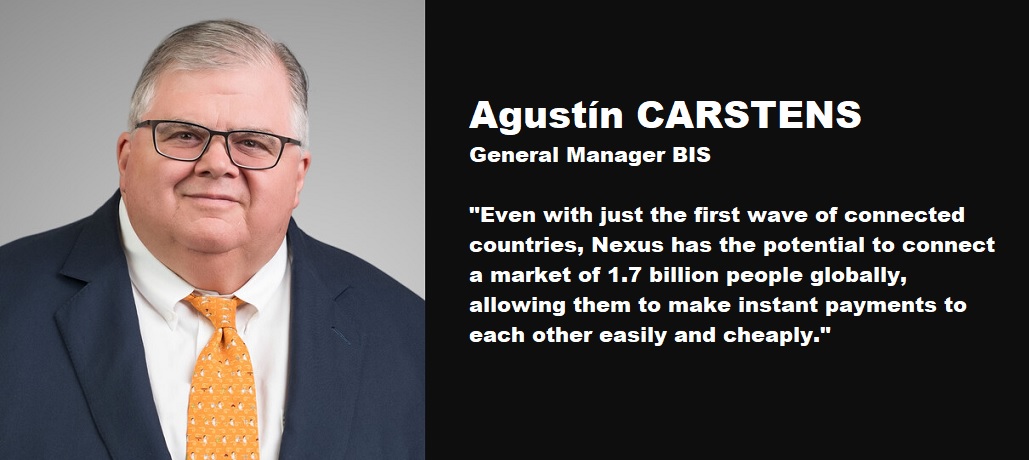
Nexus is a BIS Innovation Hub project that seeks to enhance cross-border payments by connecting multiple domestic instant payment systems (IPS) globally. BIS will facilitate central banks and IPS operators of India, Malaysia, the Philippines, Singapore and Thailand as they work towards live implementation in the next phase, with Bank of Indonesia as special observer.
The Bank for International Settlements (BIS) and partners today announced that they have completed the comprehensive blueprint for phase three of Project Nexus, which will allow ready participants to work towards the next stage of seamlessly connecting their instant payment systems.
Phase four will see Bank Negara Malaysia, Bangko Sentral ng Pilipinas, the Monetary Authority of Singapore, the Bank of Thailand and domestic IPS operators – who worked together in phase three – joined by the Reserve Bank of India, expanding the potential user base to India’s Unified Payments Interface (UPI), the world’s largest IPS.
Bank Indonesia (BI) will continue its association with the project with special observer status. BI took part in phase three and will continue in this capacity to follow the project in the next stage of its development.
Nexus is designed to standardise the way domestic IPS connect to one another. Rather than an IPS operator building custom connections for every new country to which it connects, the operator only needs to make one connection to Nexus. This single connection would allow the IPS to reach all other countries in the network.
Agustín Carstens, General Manager of the BIS: „I wish our partners in Nexus every success as they advance the project from concept to reality. This is the first BIS Innovation Hub project that central banks are moving towards a live phase together with instant payment providers. When implemented, it will greatly enhance cross-border payments in line with both the G20 cross-border payments programme and our mission to develop public goods in the technology space to support central banks and improve the functioning of the financial system.
Even with just the first wave of connected countries, Nexus has the potential to connect a market of 1.7 billion people globally, allowing them to make instant payments to each other easily and cheaply.„
The conclusions and lessons of phase three of Nexus are described in a report published today. This is complemented by a detailed scheme rulebook and technical implementation guides, as well as ISO 20022 message specifications, which are available to central banks on request.
To facilitate live implementation, the partner central banks and IPS operators have agreed to work towards establishing a new entity, the Nexus Scheme Organisation (NSO), which will be responsible for managing the Nexus scheme, and continuing the mission to achieve instant cross-border payments at scale.
The NSO will be wholly owned by the central banks and/or IPS in participating countries, depending on the specific domestic structures. In developing the blueprint in phase three of Nexus, the BIS has fulfilled its role of supporting central banks in finding innovative solutions to deliver public goods and one of its key commitments as part of the G20 Roadmap for Enhancing Cross-border Payments.
While the BIS will not own or operate the NSO, it will continue its support by playing a technical advisory role as participating countries work towards taking Nexus live. It will also facilitate cooperation among members and the entry of new participants, helping to realise Nexus’s global ambition.
_______________
This work follows an earlier phase of development in which a prototype of Nexus was used to successfully connect the test versions of three established IPS: the Eurosystem’s TARGET Instant Payment Settlement (TIPS), Malaysia’s Real-time Retail Payments Platform (RPP) and Singapore’s Fast and Secure Transfers (FAST) payment system. (This work is described in Annex 1 of the new report.)
In November 2022, Bank Indonesia, Bank Negara Malaysia, Bangko Sentral ng Pilipinas, the MAS and the Bank of Thailand signed a Memorandum of Understanding (MoU) on Cooperation in Regional Payment Connectivity, which highlights the collaborative effort within the region towards establishing cross-border payment connectivity, including via fast payment linkages. Since the signing of the MoU, Brunei Darussalam Central Bank, Bank of the Lao People’s Democratic Republic and the State Bank of Vietnam have joined the initiative.
The BIS Innovation Hub commenced the project in 2022, and its Singapore Centre has worked with the current partners over the past year to develop a comprehensive scheme and governance framework, commercial model and technology blueprint.
Central banks, standard-setting bodies, IPS operators and commercial entities around the world were also consulted to validate that Nexus is scalable and interoperable beyond the current participants. Nexus is one of many exploratory projects embarked upon by the BIS Innovation Hub. It is also contributing with the BIS Committee on Payments and Market Infrastructures to the G20 Roadmap for Enhancing Cross-border Payments. The Roadmap highlights interlinking of IPS as a key aim, and Nexus as a priority action that could have a significant impact on the speed, cost, transparency of, and access to cross-border payments.
Banking 4.0 – „how was the experience for you”
„To be honest I think that Sinaia, your conference, is much better then Davos.”
Many more interesting quotes in the video below: